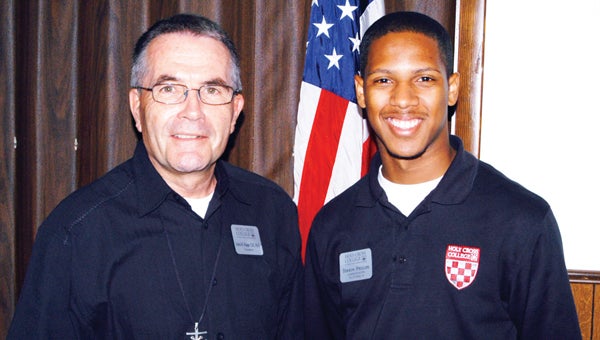Holy Cross president visits Dowagiac
Published 10:13 am Friday, June 28, 2013

Holy Cross College President John Paige and South Ben senior Terron Phillips at Dowagiac Rotary Club June 27.
Holy Cross College’s fourth President John Paige jokes about returning to South Bend from Rome as a “lateral move.”
He visited Dowagiac Thursday noon to speak to Rotary Club as guest of Eugene Staples Sr., Second Baptist Church pastor, accompanied by “rising senior” Terron Phillips, who marches with the University of Notre Dame band.
Paige, president since Jan. 1, 2011, talked about Holy Cross’s “Four Pillars” woven into the curriculum — service learning, global experience, professional internship and classroom engagement, culminating in the “capstone presentation,” a 45-minute, multi-media public program to verify they fulfilled learning outcomes with their experiences and “what skills they need to put the passion they’ve discovered at the service of others.”
From 2004 to 2010, Paige served a six-year term as elected Vicar General of the Congregation of Holy Cross in Italy, directing and supervising the mission and ministry of the Holy Cross fathers and brothers worldwide.
In his long career in education as a teacher, coach, athletic director, dean, principal, board member, president/CEO and college professor, he also served the U.S. Congregation of Holy Cross as Master of Novices from 1983 to 1989.
A native of Albany, N.Y., and a member of the Eastern Province of Brothers, he earned his bachelor’s degree in physics from the University of Notre Dame in 1968, a master’s degree in mathematics from Wesleyan University in Middletown, Conn., in 1976, a degree in applied theology from the Graduate Theological Union, Berkeley, Calif., in 1983 and was awarded the doctor of philosophy degree from the University of Maryland at College Park in 1998.
Paige’s dissertation focused on educational institutional development in Uganda, East Africa, where he served as visiting professor of social science at the Philosophy Centre, Jinja, and adjunct professor on the faculty of education at Makerere University.
He wrote a 2000 book about the experiences of the Congregation of Holy Cross educators during Uganda’s civil war, “Preserving Order Amid Chaos: The Survival of Schools in Uganda, 1971-1986.
From 1999 to 2004, Paige served at St. Edward’s University in Austin, Texas, as associate professor and dean of the School of Education.
“If you live long enough, you get to do a lot of things,” he said.
“For 40 years we were a two-year community college — Rudy’s school.”
Service is carried out in teams of 12. “When the culture makes everybody look at individualism,” Paige said, “we’re trying to help our kids understand networking. I hope we’re growing more Rotarians, Knights of Columbus or Elks because we’re giving them an understanding to be part of a service club. Those relationships are broadening to their family and community lives.”
In the classroom, “Everyone is a real professor, not a graduate student or teaching assistant. There are no classes larger than 30” with 500 students at the private school. “The environment is back-and-forth discussion and critical thinking and articulating your facts in a real cohort of students with a mentor teacher. I had 500 in general chemistry when I went to Notre Dame.”
Holy Cross stresses a “global perspective on life because it’s extremely important,” he said. “For example, we have a group that goes for a long weekend to Dearborn to live with the Arab American community, who are both Muslims and Christians. All of us can stand to be open to something broader. Overseas, students go to south India to work with street children; Ghana, in West Africa, working with the deaf; Lima, Peru, working with handicapped kids; to Brazil on the Amazon; to Mexico. These are profound, life-changing experiences for our young people.”
More than half of students live on campus in residential housing.
Holy Cross’ five-year plan envisions growing to 600 students, but not much larger or risk losing its “uniqueness.”
“The Congregation of Holy Cross also sponsors our big brother and big sister, the University of Notre Dame and St. Mary’s College,” Paige said. “But we don’t ‘survive in their shadow.’ We’re not in competition. What we do can’t be done at Notre Dame with 11,000 students. St. Mary’s concentrates on women. We have both men and women. All students at all three places have the same privileges. ‘Notre Dame, Ind.,’ is a ZIP Code of all students. We have a consortium agreement not only with Notre Dame and St. Mary’s, but also Bethel College, Indiana University South Bend (IUSB), Goshen College and Ivy Tech. Our tuition, $24,500, is half of Notre Dame’s. On the tri-campus, we can use all the facilities — sports, research, library are equally open to Holy Cross students. The brothers started Holy Cross College in 1966 because we felt Notre Dame and St. Mary were becoming so national, elite and expensive, our mission in education was out of reach. We started Holy Cross to give people a chance to get started and prove themselves as college students so they could get scholarships to our schools out of their reach otherwise. Because of this consortium, I don’t have to build climbing walls, swimming pools and stadiums. We get to use the ones that are already there. It’s a good synergy between the three institutions.”
Phillips, a history major from South Bend with three minors — political science, philosophy and theology — not only marches in the band, where he met Staples’ son, but the trumpet player helped found Holy Cross’ pep band sophomore year.
A “rising senior” has completed junior year. Senior year starts in August.
“At Holy Cross, because I have that one-on-one personal relationship with my professors, when I learn about the Harlem Renaissance of the 1920s, I can go deeper and learn more in depth. This past May I traveled to the Mediterranean with the Notre Dame band. I got to sing and play. I’ve really enjoyed my time at Holy Cross and will cherish the years I had. I’m going to have a hard time leaving next year. I’m doing international service next summer. My church’s youth choir goes to nursing homes to sing,” Phillips said.






